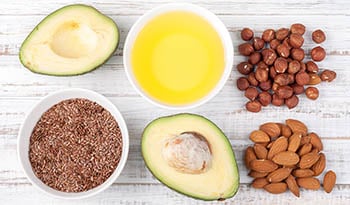Keto-diætfordelene: hjernesundhed, vægtstyring og mere

Oprindeligt skrevet marts 2018/Opdateret februar 2023
Hvad er Keto-dietten? Hvordan virker det?
Den ketogene (keto) diæt bliver populær, fordi mange mennesker har succes med det til vægttab. Keto-diet er også en medicinsk ordineret diæt til visse typer epilepsi.
Keto-dietten fokuserer på at spise højt fedtindhold, begrænsede niveauer af protein og holde kulhydratindtaget lavt, f.eks. under 50 gram om dagen. Generelt er de samlede kalorier opdelt i 70% fedt, 20% protein og 10% kulhydrater.1
Når folk spiser færre kulhydrater, producerer kroppen ketoner. Ketoner er små brændstofmolekyler produceret i leveren. Med keto-dietten skifter kroppen sin brændstofforsyning til primært at regulere fedt.
Generelt har kroppen og hjernen brug for ca. 100 gram kulhydrater, der skal indtages dagligt for at imødekomme energibehovet. Så når kulhydratindtagelsen er lav, vil skeletmuskulaturen nedbryde glykogen, lagringsformen for glukose, og frigive det i blodet. Men denne opbevaring er begrænset. Typisk har en person ca. to dages lagret glukose som glykogen. Kroppen vil altid kræve noget glukose i blodet for at opretholde livet. Kroppen vil begynde at ofre muskler og organer, der indeholder protein, hvis kulhydrater ikke indtages. Nogle af aminosyrerne i protein kan omdannes til glukose af leveren.
Keto og hjernefordele
Når glukoselagre er begrænsede, kan den menneskelige hjerne udnytte en backup energikilde. Hjernen er det mest metabolisk aktive væv i kroppen. Så det har brug for en konstant energikilde. I typiske situationer er det næsten udelukkende afhængig af glukose. Når glukose er knap, kan hjernen forbrænde forbindelser kendt som ketoner. Disse forbindelser produceres i leveren fra fedtsyrer. Ketoner har en stærk, karakteristisk lugt og er grunden til, at mange mennesker, der følger en lavkulhydratdiæt, oplever dårlig ånde.
Med keto-dietten er målet at forbedre forbrændingen af fedt til energi samt producere ketoner til hjerneenergi. Keto-dietten har vist sig at være meget effektiv i nogle tilfælde af epilepsi, hvor lægemiddelterapi alene ikke har kontrolleret anfald. Dette kan skyldes, at keto-dietten producerer lavere oxidativt stress og forbedret mitokondriefunktion. Oxidativt stress fører til aldringsprocessen og cellulær skade, mens mitokondrier er de energiproducerende rum i celler. Generelt betyder reduktion af oxidativt stress og forbedring af energiproduktionen forbedret cellulær funktion, især i hjernen, da den er så metabolisk aktiv. Keto-dietten ser også ud til at udøve en antiinflammatorisk virkning på hjernen.
Som nævnt ovenfor bruges keto-diet til at behandle nogle tilfælde af epilepsi. Det undersøges også til brug i andre hjernesygdomme, herunder Alzheimers sygdom og Parkinsons sygdom.2
Keto og vægttab
Keto-dietten kan effektivt forbedre glukosekontrol, insulin og blodlipidniveauer.1 Det kan også bruges til at fremme vægttab. Vægttabseffekterne af en keto-diæt kan mærkes meget tidligt. De fleste mennesker, der følger en keto, ser et hurtigt vægttab på 10 til 12 pund (4 til 5 kg) inden for de første to uger. Imidlertid er en betydelig del af det indledende vægttab vand og muskelmasse. Hvert glykogenmolekyle binder seks molekyler vand, så da keto-dietten fører til glykogenudtømning, fører det også til tab af kropsvandindhold. Det kan betyde betydeligt vægttab. Men hvis glykogenniveauerne genoprettes, vender noget vægttab hurtigt tilbage. En anden forsigtighed er, at tab af muskelmasse er et problem af flere grunde. Da det vedrører stofskifte, kan tab af muskelmasse sænke stofskiftet betydeligt. Mager muskelmasse er den primære fedtforbrændende ovn i kroppen. At miste muskelmasse kan sætte stofskiftet op til vægtøgning på grund af mindre forbrændt fedt (kalorier).
Er Keto-dietten egnet til langvarig brug?
Mens kortsigtede fordele kan opnås med keto-dietten, er langsigtet overholdelse af keto-dietten kontroversiel. For det første er det en restriktiv diæt, som ikke alle kan følge. For det andet kan keto-diet fremme ketose og høje niveauer af ketoner i blodet. Denne situation er normalt ikke farlig, selvom den kan være livstruende, hvis den er alvorlig. Gruppen med størst risiko for svær er diabetikere med dårlig glukosekontrol. Det største spørgsmål, der skal besvares tilstrækkeligt til dato, er, om fremme af ketose er en sund tilstand. Hvad der vides fra data fra befolkningsbaserede undersøgelser er, at kulhydratfattige diæter generelt ikke er egnede til langsigtet sundhed.3
Mens raffinerede kulhydrater og højt forarbejdede fødevarer, der indeholder sukker, hvidt mel og andre raffinerede kornprodukter, er problematiske kulhydrater, er der mange lavglykæmiske frugter, grøntsager og andre plantefødevarer, der er næringsrige og høje i kostfibre, der er udelukket fra keto-dietten. Alvorlig udelukkelse af disse fødevarer kan være usund. Det er her kontroversen om keto-diæter primært ligger.
Forbedrer problemet med reduceret indtagelse af sunde plantefødevarer, og mange mennesker, der følger keto-kosten, kan fokusere deres kalorier næsten udelukkende på animalsk fedt og protein. Det ser også ud til at være et problem. I en analyse af over 432.179 forsøgspersoner < 40% of calories) and high carbohydrate consumption (greater than > var både lavt kulhydratforbrug (mindre end 70% af kalorierne) forbundet med større dødelighedsrisiko end moderate kulhydrater. Yderligere stigende dødelighedsrisiko var at reducere kulhydratindtagelsen i bytte for animalsk afledt fedt eller protein. Dødelighedsrisikoen faldt imidlertid, når den reducerede kulhydratsubstitution var plantebaseret. Specifikt var keto-dietten, ligesom kostmønstre fokuseret på animalske afledte protein- og fedtkilder såsom oksekød, svinekød, lam og kylling, knyttet til højere dødelighed. I modsætning hertil var keto-diætlignende mønstre, der fokuserede mere på planteafledt protein og fedtindtag fra kilder til grøntsager, nødder, bælgfrugter og fuldkorn, forbundet med lavere dødelighed.3
Tips til keto-diæt
Mens du følger keto-dietten, er det vigtigt at holde kulhydratindtaget på mindre end 50 gram dagligt. Så det er vigtigt at vælge kulhydrater klogt. Fokuser på næringstætte, lavglykæmiske valg såsom grønne bladgrøntsager såsom ruccola, spinat, grønkål, sennepsgrønt og kålfamiliegrøntsager som broccoli, blomkål, rosenkål og bok choy, paprika, agurker og selleri. Bær er også et godt valg, men husk at en kop bær vil give ca. 25 gram kulhydrat eller ca. halvdelen af tildelingen på højst 50 gram dagligt.
For at følge en sund version af keto-kosten er det vigtigt at fokusere på fødevarer, der er rige på sundhedsfremmende fedtstoffer og olier, såsom dem, der findes i nødder og frø, olivenolie, avocado, fisk og andre skaldyr. Det er også vigtigt at vælge græsfodrede sorter af oksekød, lam og andet kød.
Vigtige næringsstoffer til Keto
Keto-dietten kan føre til ernæringsmæssige mangler, især for thiamin (vitamin B1), folat, vitamin C og D, calcium, magnesiumog kalium. Kaliumtabet kan være betydeligt, så brug af en kaliumchloridbaseret salterstatning kan være meget gavnligt for at holde kaliumniveauerne i det rette interval.
Keto-diet kan også forårsage forstyrret fordøjelsesfunktion, der fører til gas, oppustethed og ændringer i afføring. Disse mindre fordøjelsesklager kan undertiden reagere positivt på brugen af fordøjelsesenzymer.
Referencer:
- Nuwaylati D, Eldakhakhny B, Bima A, Sakr H, Elsamanoudy A. Lavkulhydratfattig kost med højt fedtindhold: En SWOC-analyse. Metabolitter. 2022 17. november; 12 (11): 1126.
- Dyńka D, Kowalcze K, Paziewska A. Rollen af ketogen diæt i behandlingen af neurologiske sygdomme. Næringsstoffer. 2022 24. nov; 14 (23) :5003.
- Seidelmann SB, Claggett B, Cheng S, Henglin M, Shah A, Steffen LM, Folsom AR, Rimm EB, Willett WC, Solomon SD. Kostkulhydratindtag og dødelighed: en prospektiv kohorteundersøgelse og metaanalyse. Lancet folkesundhed. 2018 september; 3 (9): e419-e428.
ANSVARSFRASKRIVELSE: Wellness Hub har ikke til hensigt at stille diagnoser...

















































































 Indholdsfortegnelse
Indholdsfortegnelse











